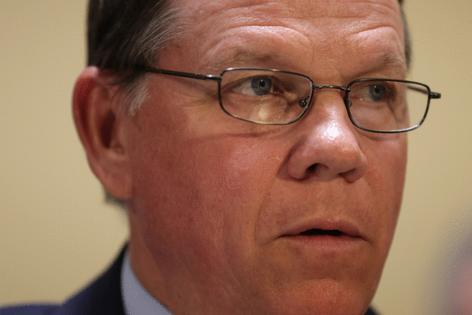House Transportation advances reconciliation plan; focus on EV fee
Published in News & Features
WASHINGTON — The House Transportation and Infrastructure Committee advanced its reconciliation provisions Wednesday after nixing a $20 universal vehicle registration fee and boosting a fee on electric vehicles to $250, easing party concerns about the controversial charges.
That decision to remove the fee, part of the panel’s initial plan to greatly boost highway and infrastructure funding over 10 years, also changed the committee’s math for funding air traffic control modernization in the text. The provisions approved Wednesday would provide $12.5 billion for the modernization, down from $15 billion in the text released Tuesday.
Even with the changes, the committee’s portion of the reconciliation bill is expected to produce far more than the panel’s deficit-reduction goal of $10 billion over 10 years.
The committee advanced the proposal in a party-line 36-30 vote.
“I don’t want to lose sight of the fact that we accomplished something historical by bringing in new dollars in the Highway Trust Fund with the fee on hybrids, fee on electric vehicles,” Chair Sam Graves, R-Mo., said in an interview after the markup. “My intent is to do away with the fuel tax and go to something different. So I’m glad we started that process.”
Democrats offered roughly 100 amendments, many of them aimed at safeguarding previously appropriated infrastructure funding and boosting oversight over Trump administration government efficiency actions. None of the amendments were adopted.
The panel, for example, rejected 30-35 an amendment from Rep. Jerrold Nadler, D-N.Y., that would prohibit the Transportation Department from rescinding grants provided to Amtrak’s Northeast Corridor prior to Jan. 20, 2025.
Another from Rep. Jared Huffman, D-Calif., would direct the government watchdog to investigate waste, fraud and abuse at the Transportation Department related to Elon Musk’s various companies, such as SpaceX, Starlink Services LLC and Tesla Inc. That amendment was rejected 30-36. Musk has been the de facto leader of the Department of Government Efficiency.
The committee initially set out a plan to levy new fees — $200 on electric vehicles, $100 for hybrid vehicles and $20 for all other vehicles, excluding covered farm and commercial vehicles — as the main means to cut billions of dollars from the deficit over 10 years. That trio of fees was projected to produce $50 billion over the next decade, according to a committee summary.
Republicans have promised that EVs will pay their share for highway repairs now primarily funded by gasoline taxes through the Highway Trust Fund. Congress has resorted to using the Treasury’s general fund to make up the difference in declining revenue, as EV and hybrid vehicle use has risen and gas-powered vehicles become more fuel efficient.
Although the proposal Tuesday was “intended to open the conversation” about fixing the Highway Trust Fund, committee leadership decided to pull the $20 fee in less than a day after they heard “concerns and questions” from some Republicans who opposed it, according to a source familiar with discussions.
The source added that Graves still sees the EV and hybrid fees as important steps toward addressing Highway Trust Fund insolvency and “isn’t shying away” from tackling the issue.
The EV fee would be increased to $250 from the initial proposal, while the fee on hybrid vehicles would remain at $100. The reduced revenue would also impact funding for Coast Guard assets, which will go from $23 billion in the initial proposal to $21.2 billion.
In line with the party’s promises to cut clean energy and climate programs, the proposal would also rescind unobligated funds for low-emission aviation technology, neighborhood equity grants, low-carbon material for federal building assistance, environmental review implementation and low-carbon transportation material grants.
©2025 CQ-Roll Call, Inc., All Rights Reserved. Visit cqrollcall.com. Distributed by Tribune Content Agency, LLC.







Comments